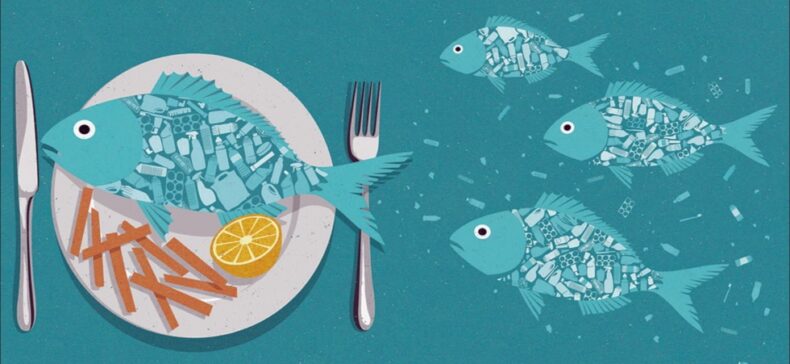Ocean pollution is taking a toll on fish, 75% of New Zealand fish have been found with Microplastics showcases the government report. Several species are on the verge of extension and ocean acidification has increased by 8.6% between the years 1998 and 2020.
In New Zealand, a government report showcases that microplastic has been found in 75% of the New Zealand fish. Three out of Four of New Zealand’s fish have located with microplastic, many indigenous seabirds and marine species are endangered with extinction, and warmer oceans are evolving uninhabitable to native species.
Microplastics are tiny plastic particles that result from both commercial product development and the breakdown of larger plastics. As a contaminant, microplastics can be destructive to the climate and animal health. Microplastic has a severe effect on animal and humans healths. When larger plastic particles break down into smaller particles it leaves a destructive effect on oceans and the atmosphere.
According to the report released by the ministry of environment’s marine stocktake found that 22% of Marine Mammal Species, 82% of indigenous shorebirds, and approximately 90% of indigenous seabirds are classified at the verge of becoming extent. Climate change is already taking a toll on us, and ocean pollution was a new vendetta of the discussion among the leaders of countries. But as the saying is action speaks louder than words. This report is showcasing the reality of the spoken words of the leaders.
Between 1998 and 2020 the report’s data showcases that ocean acidification increased by 8.6% between the years 1998 and 2020. The general water temperature was growing, and marine heat waves are evolving more regularly and fierce. In a year more than 4,100 seabirds were killed by longline fisheries. For taonga ( treasured ) species the more acidic oceans are becoming uninhabitable and affecting traditional food sources for Māori.
“The report is right to say it paints a sobering picture,” are the words of the environment minister, David Parker. He suggested the ban on single-use plastic bags, work on emission reduction plans and freshwater administration programs as samples of the nation’s action to ease some of the stress on ocean environments.
The Green party representative, Eugenie Sage, blamed the government for the deteriorating marine health. Sage said that it was the government’s delinquency that landed the marine life in the situation.
Eugenie Sage who is the representative of The Green party has blamed the government for the deteriorating aquatic health. According to her, it was the government’s delinquency due to which marine life faced such situations.

Effects of Microplastics on Fish and Human Health
Microplastics have severe effects on humans and fish due to which it has already been regarded as a global issue. Fishes are a very important source of protein in humans, which are very essential for the growth of the human body. The mixture of fish with Microplastics is the primary risk that would require special attention. If fish are going to have exposure to hazardous chemicals, pollutants and microplastics then it will have a severe effect on fish’s health and they can face combinations of health issues. Microplastics can cause oxidative stress, tissue damage, and transformation in immune-related gene manifestation also antioxidant status in fish. If the fish is exposed to microplastic then they may suffer from growth retardation, behavioral abnormalities, and neurotoxicity. Microplastic consequences on the human body are badly comprehended. The human may suffer cytotoxicity, neurotoxicity, immune system disruption, oxidative stress, and transfer of microplastics to other tissue after being exposed to them. It’s still unknown what would be the toxic effect of microplastics on humans and fish. Microplastics have hazardous effects on animals, humans, and the environment.

image credit – frontiersin.org













